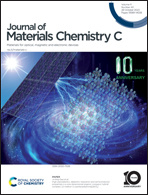Guest-controlled polymorphism and exceptionally marked bi-stability in a spin crossover 3D porous amino-functionalized coordination polymer†
Abstract
Functionalization of spin crossover (SCO) porous coordination polymers (PCPs) with hydrogen-bonding active groups is an efficient strategy for the study of multifunctional materials. Indeed, the interaction of guests with the host framework may improve the cooperativity of the SCO inducing eventual occurrence of bi-stability. However, comprehensive magneto-structural studies are still needed to understand the role of guests in the enhancement of the SCO properties. Here, we report the 3D Hofmann-type PCP {FeII(dpyan)[AuI(CN)2]2}·guest (dpyan = 2,5-di(pyridin-4-yl)aniline; guest = ethanol (1·EtOH), methanol (1·MeOH), nitrobenzene (1·NO2Bz), water/methanol (1·H2O·MeOH)) where the amino functionalized dpyan ligand has been selected to induce host–guest interactions. Our X-ray diffraction studies reveal that the packing mode of 1·guest is determined by the trapped guest yielding either orthorhombic (1·NO2Bz and 1·H2O·MeOH) or monoclinic (1·EtOH and 1·MeOH) phases differing by subtle distortions of the framework. The thermal dependence of the magnetic susceptibility shows that all derivatives present SCO properties modulated by the amount and nature of the encapsulated guest as well as by the crystal phase. The latter is clearly evidenced for the orthorhombic derivatives which, concomitantly with partial desorption of guest, transform into the monoclinic phase whose SCO behaviour is radically different to that of the original orthorhombic structure. As a relevant example, when 1·NO2Bz (orthorhombic) converts into 1·0.77NO2Bz (monoclinic), the SCO drastically changes from a non-hysteretic gradual spin transition to a cooperative SCO with a colossal hysteresis 105 K wide. These remarkable SCO properties have been interpreted relying on the obtained structural information.



 Please wait while we load your content...
Please wait while we load your content...